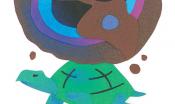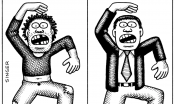publication
4,340 Results
text
Informational
The Indian Problem Is Getting Worse—Isn't It Great?
In this blog post, Houska emphasizes the enduring spirit of the Native American people and their culture, outlines the group’s past and present obstacles and calls to action young Native Americans to carry on the torch of resilience.
July 29, 2016
text
Literature
How the World Came to Be

These creation myths, from two different cultures, consider how the world came to be.
July 9, 2014
article
Helping Temporary Students Feel Welcome
Welcoming a temporary student holds lessons in empathy and respect for the whole class.
article
The Infamous N-word
No matter the spelling or context, the n-word remains intertwined with American racial tensions past and present.
text
Visual
Crazy Versus Eccentric

In this ironic cartoon, the same man is depicted twice—once with tattered clothing and unkept body hair as a poor man and a second time in a suit with a clean-cut image as a rich man. As a poor man, he's regarded as crazy, but as a rich man, he's eccentric.
July 2, 2014
article
The Problem With Pronouns
Supporting trans and gender-fluid students requires the courage to try until you get it right.
article
Blogging and the Immigrant Experience
To help her students understand each other’s stories, backgrounds and experiences—and to improve their writing—this teacher added blogging to her curriculum.
text
Literature
A Place Where Sunflowers Grow
Mari and her family have been sent to an internment camp in Utah. She does not understand what they have done to deserve their internment and longs for her backyard in California where she used to grow sunflowers.
April 7, 2016
article
In Memoriam

At least 152 people have died in K–12 school shootings since April 20, 1999. We honor their memories.